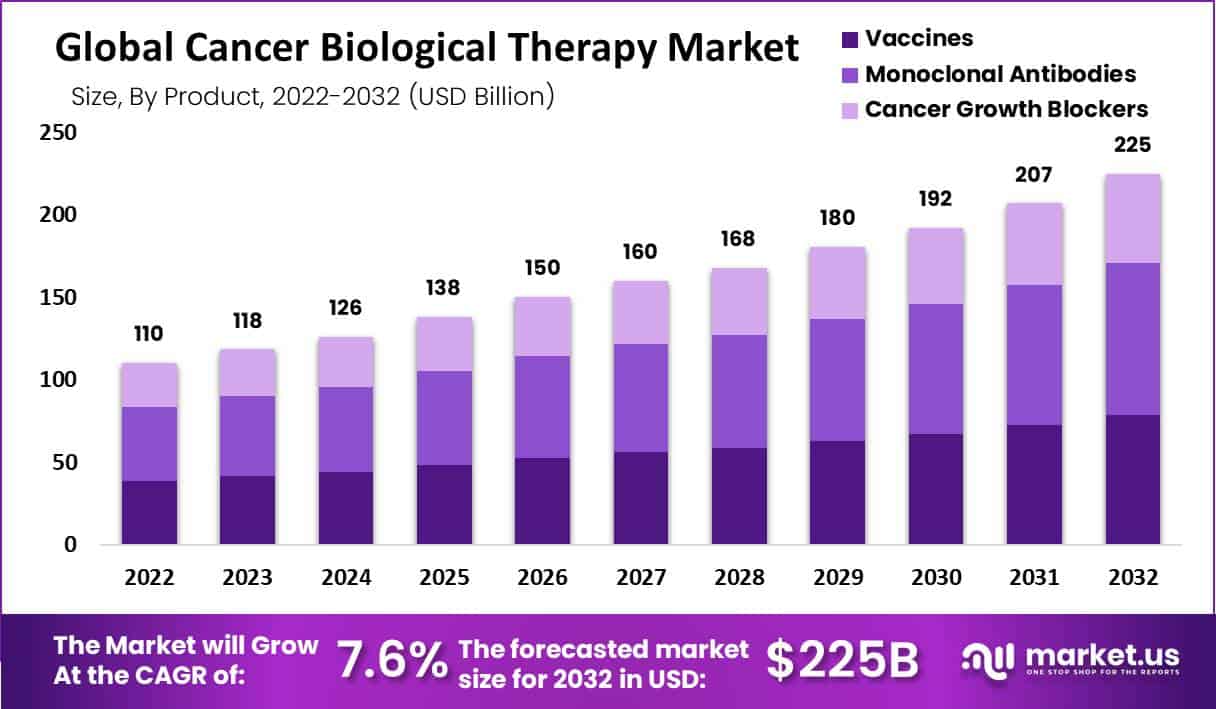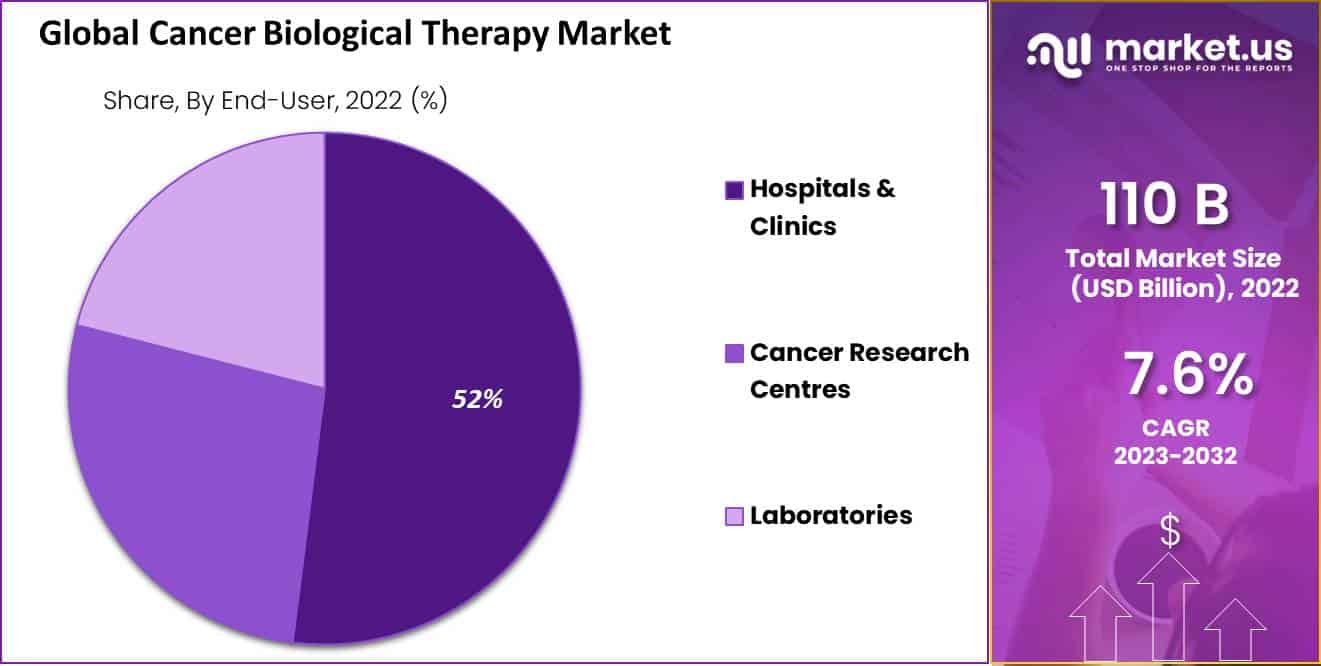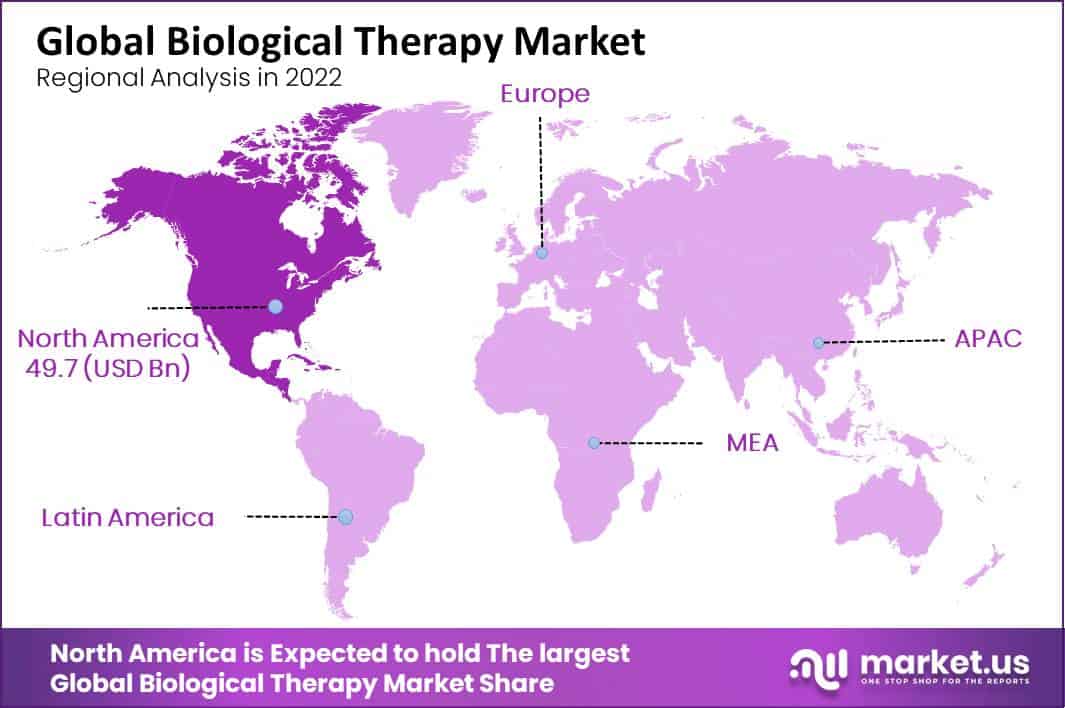Global Cancer Biological Therapy Market By Product Type (Vaccines, Monoclonal Antibodies, and Cancer Growth Blockers), By Route of Administration (Oral and Injectable), By End-User (Hospitals & Clinics, Cancer Research Centres, and Laboratories), By Distribution Channel (Specialized Cancer Treatment Centers, Hospital Pharmacies, and Retail Pharmacies), By Region and Companies - Industry Segment Outlook, Market Assessment, Competition Scenario, Trends, and Forecast 2023-2032
- Published date: Oct 2023
- Report ID: 66398
- Number of Pages: 346
- Format:
-
keyboard_arrow_up
Quick Navigation
Report Overview
Global Cancer Biological Therapy Market size is expected to be worth around USD 225 Billion by 2032 from USD 110 Billion in 2022, growing at a CAGR of 7.6% during the forecast period from 2023 to 2032.
A treatment that treats disease with substances made by living things. The body may produce these substances naturally or in the laboratory. In the fight against cancer, some biological therapies either stimulate or suppress the immune system. Specific cancer cells are targeted by other biological therapies, which can either stop them from growing or kill them. Additionally, they might lessen some of the side effects of cancer treatments.
The global market for cancer biological therapy is anticipated to expand as a result of the rising incidence of the disease and the proliferation of specialized cancer treatment facilities. In the market for cancer biological therapy, several specialists are concentrating on applying nanotechnology to provide development therapy to patients.

*Actual Numbers Might Vary In The Final Report
Key Takeaways
- Biological Therapies Defined: Biological therapies, also referred to as immunotherapy and targeted therapy, are types of cancer treatment using substances from living organisms to specifically attack cancerous cells or strengthen immunity and help defend against it.
- Expanding Treatment Options: As innovative therapies offer new treatment solutions for difficult-to-treat cancers, biological therapy market is expanding quickly.
- Immunotherapy Advancements: Immunotherapy has made great strides towards cancer treatment by strengthening our immune systems’ ability to recognize and attack cancerous cells.
- Targeted Therapies: Targeted therapies are treatments designed to block specific molecules involved with cancer growth, and have become an increasingly popular treatment in various cancer types, often with reduced side effects compared to traditional chemotherapy regimens.
- Personalized Treatment Approach: Biological therapies frequently employ personalized approaches tailored specifically to a patient’s cancer type and genetic makeup.
Product Analysis
During the forecast period, the monoclonal antibodies segment is anticipated to dominate the cancer biological therapy market and hold the largest market share
Based on product, the global cancer biological therapy market is segmented into vaccines, monoclonal antibodies, and cancer growth blockers. Monoclonal antibodies are a type of protein that can bind to specific targets in the body, such as antigens on the surface of cancer cells, and are produced in the laboratory.
Monoclonal antibodies are molecules made in the laboratory that can replace antibodies and restore, modify, enhance, or imitate the immune system’s attack on unwanted cells like cancer cells. Non-hospitalized patients with risk factors for severe disease progression who receive monoclonal antibody therapy experience a reduction in deaths and hospitalizations.
Reactions at the injection site with subcutaneous administration and transfusion-related reactions have been observed as adverse events. Vaccines are predicted to grow at a significant CAGR in the upcoming period. Cancer vaccines primarily employ tumor-specific antigens (TSAs) and tumor-associated antigens (TAAs) to activate the patient’s immune system.
The vaccine could theoretically elicit both humoral and specific cellular immunity to halt tumor growth and eradicate tumor cells. Over the past few years, cancer vaccines have contributed to a significant survival rate. A biological treatment for cancer, cancer growth blockers, also known as cancer growth inhibitors, prevent cancer cells from growing and multiplying. A complicated system of signal transduction helps cells communicate. A signaling pathway within the cell is triggered when growth factors bind to receptors located on the cell surface.
Cell growth is initiated by this intricate pathway. Tumor formation and increased cell division can result from uncontrolled cell growth. The various growth factors are classified according to their contribution to cell growth. Some growth factors control how cells specialize into particular functional cell types. While some inhibit cell division and cell proliferation, others promote cell division and growth.
Route of Administration Analysis
The Injectable route is the most preferred treatment option and hence accounted for dominating the market
Based on the route of administration, the cancer biological therapy market is divided into oral and injectable. Among these types, the injectable is the leading segment and holds the maximum market share. The intravenous injectable type is well-known for its rapid action due to its 100% bioavailability, hence preferred most in emergencies.
The oral segment will be the fastest growing segment due to rising preferences among physicians and patients as they are easy to administer and eliminate unfavorable side effects such as fever, chills, and soreness at the injection site. The extensive R & D activities and conduct of clinical trials are expected to boost the segment growth.
End-User Analysis
The hospitals & clinics segment dominated the global market
Based on end-user, the global cancer biological therapy market is divided into hospitals & clinics, cancer research centers, and laboratories. Among these end-users, the hospitals & clinics segment is the most lucrative and dominates the market with the largest revenue share. The cancer care unit in hospitals & clinics strives to create the ideal treatment environment by providing world-class care in a patient-friendly setting.
The cutting-edge oncology department offers comprehensive and convenient patient-centered care, cutting-edge diagnostic tools, and scientifically advanced treatment options like biological therapy, all under one roof. Passion for cancer care extends beyond the walls of the cancer care unit in hospitals, including strict infection control guidelines for patients. These are the major factors contributing to the growth.

By Distribution Channel
Specialized cancer treatment centers dominate the cancer biological therapy market
Based on the distribution channel, the cancer biological therapy market is divided into specialized cancer treatment centers, hospital pharmacies, and retail pharmacies. Among these, the specialized cancer treatment centers held the largest revenue share. Laboratory, clinical, and population-based research are conducted at cancer centers. Most cancer centers treat cancer patients, but some only conduct laboratory research.
The hospital pharmacies are accounted to collect the maximum revenue during the forecast period. The growing number of cancer patients and rising drug usage for cancer treatment are subject to drive the growth of this segment.
Key Market Segments
By Product
- Vaccines
- Monoclonal Antibodies
- Cancer Growth Blockers
By Route of Administration
- Oral
- Injectable
By End-User
- Hospitals & Clinics
- Cancer Research Centres
- Laboratories
By Distribution Channel
- Specialized Cancer Treatment Centers
- Hospital Pharmacies
- Retail Pharmacies
Drivers
Rising cancer cases in individuals
One of the most common causes of death and illness worldwide is cancer. In 2021, the World Health Organization estimated there would be approximately 18.1 million new cancer cases worldwide. In addition, a rapidly aging population susceptible to severe diseases will boost business expansion. Changes in eating habits that include alcohol and tobacco use will increase the number of cancer cases even more, which will drive growth in the cancer biological therapy industry.
The growth of the cancer biological therapy market will be sped up by rising healthcare costs and government support for cancer therapies. The World Health Organization (WHO) projects a 70% increase in new cancer cases over the next two decades, primarily as a result of rising tobacco and alcohol consumption.
Increasing Healthcare Awareness
Patients and healthcare professionals alike are becoming more aware of the prevalence of cancer. Both patients and medical professionals are now actively participating in research into the various treatments for these severe conditions. This is one of the market’s most significant drivers. Thus rising cancer prevalence opens up more market opportunities.
Rising survival rate
The rising rate of cancer survival, rising demand for cutting-edge treatments, the expansion of cancer healthcare services in developing nations, and shifting lifestyles are all driving the global cancer biological therapy market.
Restraints
High treatment costs
The market’s expansion is bound to be hampered by the substantial costs associated with the treatments. Many of this disease’s treatments are expensive, making them sometimes difficult for individuals, especially those in rural areas. As a result, this may be a significant market constraint.
Limited number of skilled professionals
Over the course of a forecast period, the expansion of the global market for cancer biological therapy could be stifled by a dearth of qualified professionals who are unaware of the disease’s treatment options.
Opportunity
Development of diverse treatment options
The application of nanotechnology to provide patients with cutting-edge treatment is the primary focus of researchers in the cancer biological therapy market. Cancer diagnosis could greatly benefit from nanotechnology. Additionally, materials science and protein engineering advancements are anticipated to aid physicians in more precisely targeting cancer cells. Cancer patients are expected to gain a new sense of hope from this.
New Launches are encouraged due to patent expiration
Several previous companies’ patents may have expired, opening up new market opportunities. The widespread use of combination therapies is a major contributor to the expansion of the market for cancer biological therapies.
Trends
Governments of various nations are implementing initiatives to raise awareness of cancer and its diagnosis
Worldwide, the burden of cancer is increasing, and cancer treatments may be altered following regional and national priorities. Cancer biological therapy aims to get the immune system to recognize and destroy cancer cells. There were approximately 19,298,790 new cases of cancer and 9,968,149 reported cases worldwide, according to the Globocan Report 2020.
The most common types of cancer are those found in the breast, lungs, colorectum, and prostate. In the treatment of various cancers, biological therapy is used to stop or slow the growth of the tumor and stop cancer from spreading. Biological therapy frequently has fewer toxic side effects compared to other cancer treatments.
In order to assist individuals in detecting cancer earlier, the governments of various nations are implementing initiatives to raise awareness of cancer and its diagnosis. For instance, the Health Minister of Tamil Nadu, India, stated in February 2022 that the Government of Tamil Nadu is participating in formulating a policy to identify 66% of cancer patients in the first and second stages by 2030 to provide appropriate treatment. The market is expected to expand as a result of these policies.
Regional Analysis
North America dominates the market for cancer biological therapy with maximum shareholding
Based on regions, the cancer biological therapy market is classified into North America, Europe, Asia Pacific, Latin America, and Middle East & Africa. Among these regions, a significant portion of the global market for cancer biological therapy is dominated by North America. Europe and Asia-Pacific are the next largest markets after North America. Rising R&D expenditures and government initiatives, the presence of numerous cancer biological drug and vaccine manufacturers, rising disposable income, affordable cancer treatment facilities, and expanding health insurance coverage for serious diseases are all driving the North American market’s expansion.
Asia Pacific is predicted to be the fastest-growing region in the upcoming years
On the other hand, the Asia-Pacific region is expected to grow at the fastest rate because of the growing number of cancer cases, the large patient population, improved healthcare facilities, and other factors. Japan accounts for a significant portion of the Asia-Pacific region’s cancer treatments market.

Key Regions
- North America
- The US
- Canada
- Mexico
- Western Europe
- Germany
- France
- The UK
- Spain
- Italy
- Portugal
- Ireland
- Austria
- Switzerland
- Benelux
- Nordic
- Rest of Western Europe
- Eastern Europe
- Russia
- Poland
- The Czech Republic
- Greece
- Rest of Eastern Europe
- APAC
- China
- Japan
- South Korea
- India
- Australia & New Zealand
- Indonesia
- Malaysia
- Philippines
- Singapore
- Thailand
- Vietnam
- Rest of APAC
- Latin America
- Brazil
- Colombia
- Chile
- Argentina
- Costa Rica
- Rest of Latin America
- Middle East & Africa
- Algeria
- Egypt
- Israel
- Kuwait
- Nigeria
- Saudi Arabia
- South Africa
- Turkey
- United Arab Emirates
- Rest of MEA
Key Players Analysis
There are several major players in the cancer biological market, which has a moderate level of competition. Mergers, acquisitions, partnerships, new product launches, and other strategic initiatives are being implemented by the companies to improve their market positions. Because biologics are quite expensive, these companies have invested a lot of funds in their research and development.
Market Key Players
Listed below are some of the major players in global cancer biological therapy market who contributes to the growth rate
- Merck & Co., Inc.
- Hoffmann-La Roche Ltd
- Novartis AG
- Amgen Inc.
- Bristol-Myers Squibb Company
- Celgene
- Eli Lilly and Company (US)
- EnGeneIC
- Pfizer
- Intas Pharmaceuticals Ltd.
- Astellas
- Otsuka
- Teva Pharmaceutical Industries Ltd.
- Bayer AG
- GlaxoSmithKline PLC
- AbbVie Inc.
- Astellas Pharma Inc.
- Seattle Genetics
- Takeda Pharmaceuticals
- Spectrum Pharmaceuticals
- Bausch Health Companies Inc.
- Johnson & Johnson Services, Inc.
- AstraZeneca PLC
- Other Key Players
Recent Development
- In February 2022, The Janssen Pharmaceutical Companies of Johnson & Johnson got U.S. FDA approval for its CARVYKTI, also known as ciltacabtagene autoleucel. Adults with relapsed or refractory multiple myeloma (RRMM) who have received four or more prior treatments, including an immunomodulator, a proteasome inhibitor, and an anti-CD38 monoclonal antibody, can be treated with this biologic medication.
- In May 2022, Biocon Biologics and Viatris, formerly Mylan, introduced the cancer drug Bevacizumab in Canada. It was sold under the brand name Abevmy. Biologics and Viatris were the two companies that developed the Abevmy. As a result, the aforementioned factors contributed to the expansion of the cancer market segment.
Report Scope
Report Features Description Market Value (2022) USD 110 Bn Forecast Revenue (2032) USD 225 Bn CAGR (2023-2032) 7.6% Base Year for Estimation 2022 Historic Period 2016-2021 Forecast Period 2023-2032 Report Coverage Revenue Forecast, Market Dynamics, COVID-19 Impact, Competitive Landscape, Recent Developments Segments Covered By Product Type – Vaccines, Monoclonal Antibodies, and Cancer Growth Blockers; By Route of Administration – Oral and Injectable; By End-User – Hospitals & Clinics, Cancer Research Centres, and Laboratories; By Distribution Channel – Specialized Cancer Treatment Centers, Hospital Pharmacies, and Retail Pharmacies Regional Analysis North America – The US, Canada, & Mexico; Western Europe – Germany, France, The UK, Spain, Italy, Portugal, Ireland, Austria, Switzerland, Benelux, Nordic, & Rest of Western Europe; Eastern Europe – Russia, Poland, The Czech Republic, Greece, & Rest of Eastern Europe; APAC – China, Japan, South Korea, India, Australia & New Zealand, Indonesia, Malaysia, Philippines, Singapore, Thailand, Vietnam, & Rest of APAC; Latin America – Brazil, Colombia, Chile, Argentina, Costa Rica, & Rest of Latin America; Middle East & Africa – Algeria, Egypt, Israel, Kuwait, Nigeria, Saudi Arabia, South Africa, Turkey, United Arab Emirates, & Rest of MEA Competitive Landscape Merck & Co., Inc., F. Hoffmann-La Roche Ltd, Novartis AG, Amgen Inc., Bristol-Myers Squibb Company, Celgene, Eli Lilly and Company (US), EnGeneIC, Pfizer, Intas Pharmaceuticals Ltd., Astellas, Otsuka, Teva Pharmaceutical Industries Ltd., Bayer AG, GlaxoSmithKline PLC, AbbVie Inc., Astellas Pharma Inc., Seattle Genetics, Takeda Pharmaceuticals, Spectrum Pharmaceuticals, Bausch Health Companies Inc., Johnson & Johnson Services, Inc., AstraZeneca PLC, and Other Key Players Customization Scope Customization for segments, region/country-level will be provided. Moreover, additional customization can be done based on the requirements. Purchase Options We have three license to opt for: Single User License, Multi-User License (Up to 5 Users), Corporate Use License (Unlimited User and Printable PDF) Frequently Asked Questions (FAQ)
How much is the Cancer Biological Therapy Market worth?Global market size is worth USD 225 Billion by 2032.
What was the value of the Cancer Biological Therapy Market in 2023?In 2023, the market value stood at USD 110 Billion.
What is the CAGR of Cancer Biological Therapy Market?The global Cancer Biological Therapy Market is growing at a CAGR of 7.6% during the forecast period 2022 to 2033.
Who are the major players operating in the Cancer Biological Therapy Market?Merck & Co., Inc., F. Hoffmann-La Roche Ltd, Novartis AG, Amgen Inc., Bristol-Myers Squibb Company, Celgene, Eli Lilly and Company (US), EnGeneIC, Pfizer, Intas Pharmaceuticals Ltd., Astellas, Otsuka, Teva Pharmaceutical Industries Ltd., Bayer AG, GlaxoSmithKline PLC, AbbVie Inc., Astellas Pharma Inc., Seattle Genetics, Takeda Pharmaceuticals, Spectrum Pharmaceuticals, Bausch Health Companies Inc., Johnson & Johnson Services, Inc., AstraZeneca PLC, and Other Key Players.
Which region will lead the Cancer Biological Therapy Market?North America is estimated to be the fastest-growing region during the forthcoming years.
 Cancer Biological Therapy MarketPublished date: Oct 2023add_shopping_cartBuy Now get_appDownload Sample
Cancer Biological Therapy MarketPublished date: Oct 2023add_shopping_cartBuy Now get_appDownload Sample -
-
- Merck & Co., Inc.
- Hoffmann-La Roche Ltd
- Novartis AG
- Amgen Inc.
- Bristol-Myers Squibb Company
- Celgene
- Eli Lilly and Company (US)
- EnGeneIC
- Pfizer
- Intas Pharmaceuticals Ltd.
- Astellas
- Otsuka
- Teva Pharmaceutical Industries Ltd.
- Bayer AG
- GlaxoSmithKline PLC
- AbbVie Inc.
- Astellas Pharma Inc.
- Seattle Genetics
- Takeda Pharmaceuticals
- Spectrum Pharmaceuticals
- Bausch Health Companies Inc.
- Johnson & Johnson Services, Inc.
- AstraZeneca PLC
- Other Key Players










